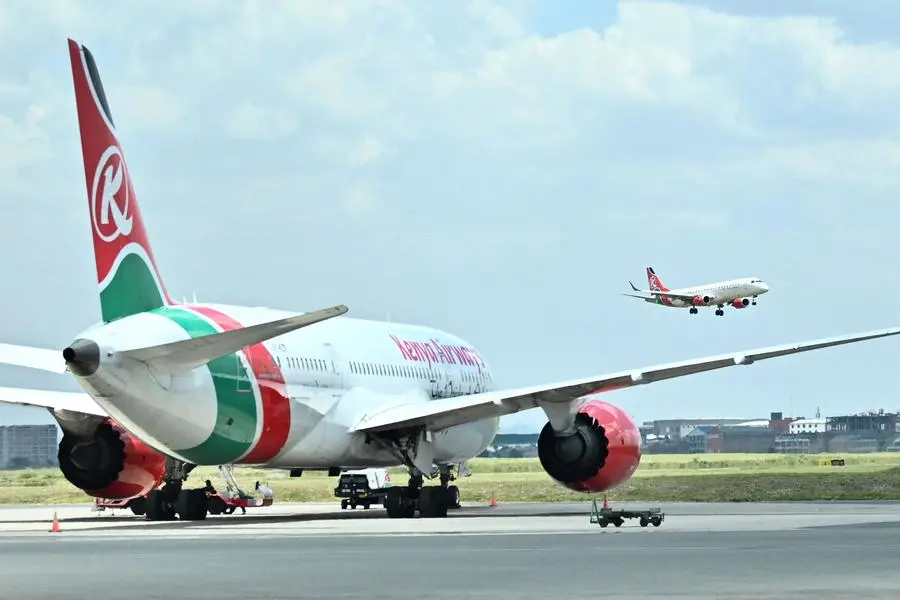PHOTO
Kenya Airways (KQ) shares are still not trading on the Dar es Salaam Stock Exchange (DSE) more than three months after Kenya’s regulator lifted the suspension of the stock on the Nairobi Securities Exchange (NSE), highlighting the challenges facing cross-listed stocks.
A review of equity trading reports on the Tanzanian bourse shows that investors are not trading in KQ shares, missing out on the opportunity to unlock value in a stock whose price has remained dormant at Tsh80 ($0.03) per share.
KQ is listed on the NSE and cross-listed on the DSE and Uganda Securities Exchange (USE).
The EastAfrican has learnt that even though companies make strategic decisions to list their shares in other jurisdictions away from their primary markets, investors find it difficult to trade in cross-listed shares, as they are largely held by shareholders domiciled in the primary markets.
While the KQ share has remained inactive on the DSE, it has gained 13.31 percent in more than three months since resuming trading on the NSE on January 6, 2025.
The share price closed at Ksh4.34 ($0.034) on April 23, representing a 13.31 percent growth from Ksh3.83 ($0.02) when trading resumed.
Uganda bourseHowever, the feel-good factor from the carrier’s improved earnings has yet to yield much impact on the USE. KQ’s share price on the USE rose from Ush113.44 ($0.03) on March 31, 2024 to Ush143.3 ($0.039) on March 31, 2025, according to the latest USE market trading data.
USE chief executive Paul Bwiso said KQ was up to date with its listing fees and regularly publishes its financials on the market.“But it does not trade a lot on the USE. We expect to receive its latest financial statements before end of this month. But I’m yet to analyse Kenya Airways’ current commercial turnaround plan,” he said.
The KQ management did not comment on the dormancy of its stock on the DSE, and instead referred us to the Capital Markets Authority.“The answers you are seeking should be from the Capital Markets Authority,” said the airline’s head of corporate communications Henry Okatch.
Kenya’s CMA says the dormancy of the KQ stock on the DSE is largely due to lack of supply of the shares as they are still held in a registry in Nairobi and are not available for trading on the Tanzanian bourse, a development the market regulator says cuts across most of the cross-listed shares in the region.“KQ was cross-listed in DSE and all the shares are registered in Nairobi. It means that there are no shares in the secondary market (DSE) and therefore trading on that market becomes very difficult, because the shares are held in Nairobi,” CMA chief executive Wycliffe Shamiah told The EastAfrican.
He added that even those shareholders in Tanzania who might have bought KQ shares through the NSE may be reluctant to sell now in anticipation of price appreciation in the future.“I’m not saying that there are no shares of KQ in Dar es Salaam completely – they will have to confirm that fact, but availability and the intentions to trade may not be there,” Mr Shamiah said.
Cross-listed stockCross-listing is usually a strategic financial decision that allows companies to expand their investor base and enhance liquidity by listing their shares on multiple exchanges.
In East Africa, 10 companies have cross-listed their shares on multiple stock exchanges. These are KCB Group, Nation Media Group (NMG), East African Breweries Limited (EABL), Kenya Airways, Equity Group, Centum Investments, Jubilee Holdings, Umeme Ltd, the collapsed Uchumi Supermarkets and the Bank of Kigali (BoK).
Kenya has most of its companies cross-listed on regional bourses. But currently, investors from Tanzania, Uganda and Rwanda who want to invest in the cross-listed companies on their respective bourses are forced to open Central Depository System (CDS) accounts in Nairobi because these shares are held in a registry by Kenya’s Central Depository and Settlement Corporation (CDSC).
This means that although these shares are cross-listed, they are not traded on the secondary market but on the NSE.“What we need is to have shares in Nairobi transferred to a depository in the other markets like USE, DSE and RSE [Rwanda Stock Exchange]. But, as long as those shares are sitting in a registry in Nairobi, trading in those shares becomes difficult,” Mr Shamiah said.
The CDS is a computer system operated by the CDSC that facilitates electronic accounts opened by shareholders and manages the transfer of shares traded on the stock market.‘Many barriers’According to the Kenya’s CMA, attempts by regional capital markets regulators to boost liquidity in cross-listed shares through the automation and linkage of the trading systems and introduction of global depository receipts (GDRs) are yet to bear fruit.“We had tried to get a system which would allow us to have junctions so that these securities are available regardless of the jurisdictions but there are many barriers. For example, there are different jurisdiction laws that you will have to go through before. We have tried to harmonise that but that project— the EAC capital markets infrastructure— has not ended,” Mr Shamiah said.“The other alternative, which has become a discussion, is what we call global depository receipts (GDRs). This requires some frameworks to be harmonised, because it is a secondary instrument that has been developed on the original instrument. So, those discussions have been there but they haven’t really moved. These were the two very near solutions to what is causing the illiquidity of cross-listed shares.”A GDR is a negotiable financial instrument that represents shares in a foreign company and is traded on local stock exchanges in the investors’ countries. GDRs make it possible for a company (the issuer) to access investors in capital markets beyond the borders of its own country.
The East African exchanges are working towards integrating the central depository systems and their electronic settlement systems into a single market in the hope of hastening trade in cross-listed shares and increasing liquidity.
Kenya Airways shares resumed trading on the Nairobi bourse in January after a suspension of more than four years to pave the way for the restructuring of the company, including a proposed State-takeover through a nationalisation process.
Read: Regulator sued over KQ shares trade freezeKQ shares were initially suspended from trading on the NSE on July 3, 2020 to allow for a reorganisation and corporate restructuring after members of parliament began to review a law that would allow the government to take over the loss-making airline and save it from potential collapse.
But the National Aviation Management Bill 2020 has since been withdrawn from parliament after the William Ruto administration backtracked on nationalising the airline.
KQ’s chief executive Allan Kilavuka had petitioned the CMA in a letter dated December 16, 2024, for an extension of the trading suspension of the shares by an additional 12 months, but the regulator rejected the request and instead directed the NSE to lift the trading suspension with effect from January 6, 2025.
It came as a relief to thousands of investors who held the KQ stock.
KQ is currently majority owned by the government (48.9 percent) and a group of 11 banks under the KQ Lenders Company 2017 Ltd (38.09 percent), Air France-KLM (7.76) percent), employees (2.44 percent) and other shareholders at 2.8 percent.
The government and 11 local banks converted part of their debts amounting to $265 million and $167.24 million into equity respectively as part of the financial restructuring plan in 2017.
The firm announced a $42 million profit for 2024, ending an 11-year drought.
© Copyright 2022 Nation Media Group. All Rights Reserved. Provided by SyndiGate Media Inc. (Syndigate.info).





















